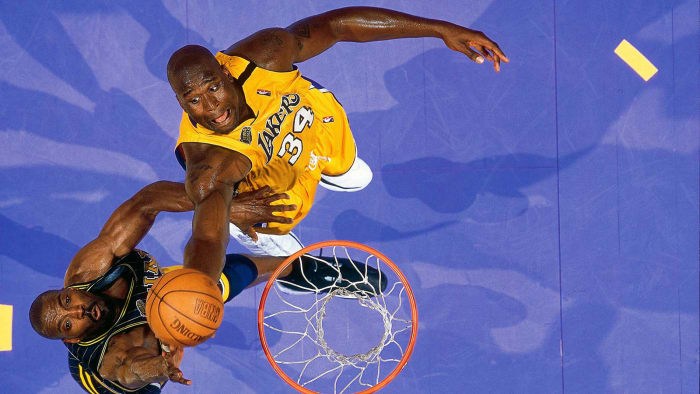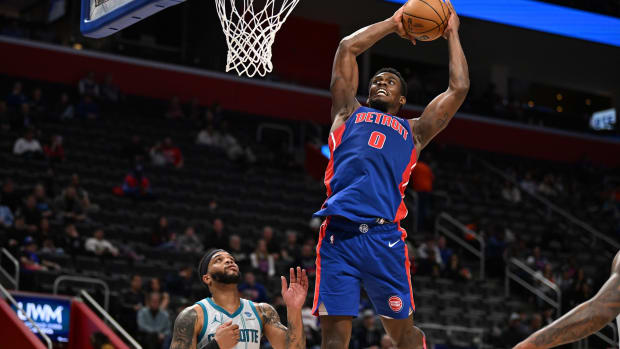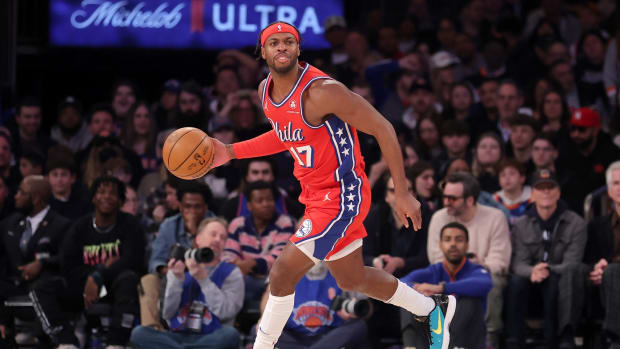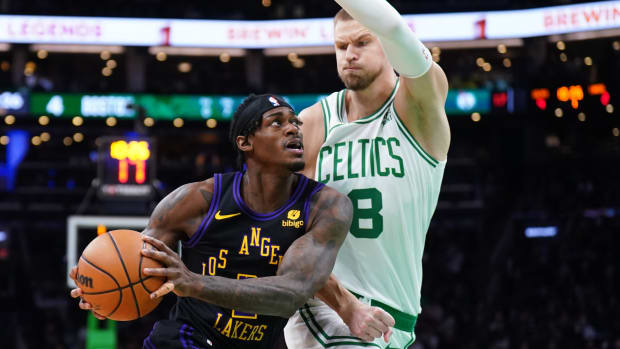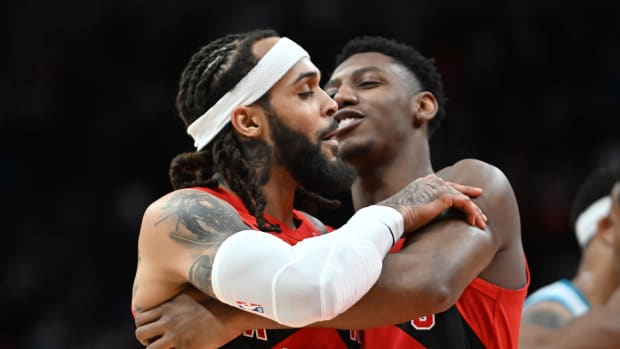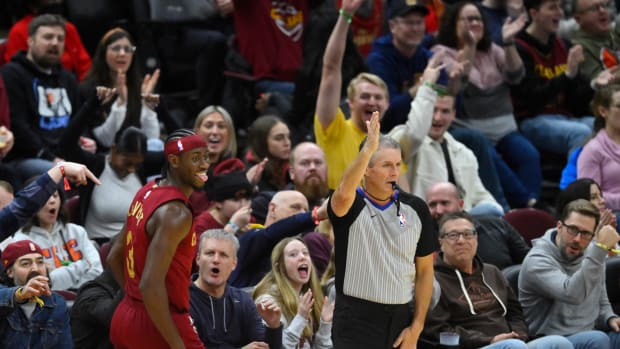The Best Basketball Player Alive Every Year, 2000s
We’re through two decades of our Best Player Alive series, and the 1990s was ruled by one player: Michael Jordan. The 2000s marked a significant turn. No one player dominated the decade, and the torch was passed from numerous players before LeBron James assumed the throne.
So who earned the top spot and who got snubbed? Check out The Crossover’s picks for the Best Player Alive every year of the 2000s below.
1999-00 - Shaquille O’Neal
Welcome to the era of Shaq. O’Neal was arguably the league’s top talent by the end of the 1990s, and by the end of 1999-00, there was little debate over who was the best player in the NBA. The Big Aristotle pulverized the NBA with a league-leading 29.7 points per game. Rik Smits and Austin Croshere may still be shuddering over the beatdown they received in the Finals. O’Neal won his first of three straight Finals MVPs in the spring of 2000, kicking off a run of dominance that is unmatched by any center this century.
Honorable Mentions – Alonzo Mourning, Karl Malone
This is Alonzo Mourning’s lone appearance on our list, though he is certainly deserving in the best year of his career. Mourning tallied a career-best 21.7 points per game on 55.1% shooting, and he led the league in blocks for the second straight year. The 90s is arguably the golden age of centers, and there was still a quality crop of big men at the turn of the century. Aside from Shaq, Mourning may have been the best.
It’s fair to have Karl Malone fatigue, especially as Utah’s dynamic duo faced the later stages of their career. But Malone kept chugging along as a truly elite player to kick off the 21st century. Utah finished second in the West and Malone finished third in points. He trailed only four players in points per game, and he trailed only Shaq in PER. Apologies to Grant Hill, who just misses out in his final year of consideration. Kevin Garnett has an appealing case, though he’s not quite ready to enter the top three. One last time, let’s acknowledge Malone’s night-to-night excellence.
2000-01 - Shaquille O’Neal
O’Neal’s run as the best player alive may not be as long as Jordan’s, but his peak nearly reaches the same heights. Shaq led the league in win shares, PER and effective field goal percentage in 2000-01, finishing third (congrats to Jerry Stackhouse) in points per game. Allen Iverson won MVP, but once again, the Finals reinforced O’Neal’s standing atop the league. Look past the Iverson step-back, and the answer is clear. Shaq bullied Dikembe Mutumbo and the 76ers in the Finals, giving Los Angeles back-to-back Larry O’Brien trophies for the first time since 1987 and 1988.
Honorable Mentions – Tim Duncan, Allen Iverson
The sheer consistency from Tim Duncan across the 2000s can make him a touch forgotten in our list, though he has a case as a top three player in seven straight years from 1998-99 to 2004-05. 2000-01 marked another terrific season for The Big Fundamental. Duncan tallied 22 points and 12 rebounds per game on 49.9% shooting, finishing the season fourth in defensive rating and first in defensive win shares. Duncan was a true anchor on both ends. While he never reached the scoring heights of his peers, his place among the game’s greats is unquestioned.
Perhaps the legend of Iverson is greater than his actual place in NBA history, but Iverson's 2000-01 is legitimately one of the great point guard seasons of the 21st century. Iverson led the league in points and steals while playing 42 minutes per game–he led the NBA in minutes seven times–carrying a middling 76ers roster to the Finals. Philadelphia stood no chance against Shaq and Co., and Iverson never won a championship. At least we’ll always have his step over Tyronn Lue.
2001-02 - Tim Duncan
Duncan and the Spurs were knocked out by O’Neal’s Lakers in the 2002 Western Conference semifinals, but the head-to-head matchup doesn’t paint the full picture. 2001-02 was arguably the best season of Duncan’s career, highlighted by a career-high 25.5 points per game. Duncan’s 17.8 win shares are 4.2 more than No. 2 on the list (shoutout Elton Brand) and only two players tallied more blocks. The playoffs are certainly an important barometer, though O’Neal was kept relatively in check with 21.4 points per game on 44.7% shooting against San Antonio. If O’Neal destroyed Duncan, maybe we’d flip our rankings. But Duncan’s regular-season excellence gives him the nod.
Honorable Mentions – Shaquille O’Neal, Jason Kidd
O’Neal didn’t pulverize Duncan and the Spurs in the 2002 postseason. The Nets weren’t so lucky. Shaq scored 36.3 points and 12.3 rebounds per game in the 2002 Finals, effectively throwing Todd MacCulloch through the baskets on numerous occasions. And the regular-season resume isn’t too shabby. O’Neal finished fourth in win shares and second in points per game, leading Los Angeles to 58 wins. The margin between him and Duncan is razor thin.
Perhaps Kobe Bryant already ascended to top three status in 2001-02, though he was still more of a Robin to Shaq’s Batman than a true partner-in-crime. Besides, Bryant will get plenty of love in our list down the line. Let’s recognize Jason Kidd. The Nets point guard finished second in the MVP voting as he guided New Jersey to the Finals, showing off a basketball intelligence arguably unmatched in his era. Kidd can be a bit of a prickly individual, and he certainly fits the mold of an exacting point guard. But his brilliance in 2001-02 shouldn’t go unnoticed in the greatest Nets season this century.
2002-03 - Tim Duncan
Duncan’s peak never quite reached Shaq’s, though he was still plenty dominant in 2002-03. Duncan finished in the top 10 in points, rebounds, blocks and PER, and he led the NBA in win shares. And the playoffs only reinforced Duncan’s spot atop the NBA. He poured in 37 points to beat the Lakers in the West semifinals, and his Game 6 of the Finals against the Nets is one of the greatest performances in NBA history. Duncan finished the night with 21 points, 20 rebounds, 10 assists and eight blocks, securing the second of his five titles.
Honorable Mentions – Kevin Garnett, Kobe Bryant
Next season will mark Garnett’s peak, though he still deserves credit for an outstanding two-way campaign in 2002-03. KG finished second in rebounds, sixth in points and 12th in assists, and only three players had more defensive win shares. Garnett finished second in the MVP voting as Minnesota won 51 games. A first-round exit against the Lakers followed, but that’s more due to the disparity in supporting casts. Garnett was a true superstar in 2002-03.
The first of many appearances for Bryant on our list is certainly well earned. He finished third in the MVP voting as he led the Lakers with 30 points per game, and he was quite efficient in the process. Bryant shot 45% from the field and 38% from three, with only Tracy McGrady topping him in scoring. We’ll see plenty of Kobe down the road.
2003-04 - Kevin Garnett
Garnett was the undisputed best player in the league looking back at 2003-04. He won 120 of 123 first-place MVP votes, and he finished second in both offensive and defensive win shares. KG won the rebounding title and placed third in scoring as Minnesota set a franchise record with 58 wins. The Timberwolves suffered seven straight first-round playoff exits from 1997 through 2003. They finally broke through and reached the Western Conference finals in 2004, solidifying Garnett’s place as the NBA’s best player.
Honorable Mentions – Tim Duncan, Kobe Bryant
Another year, another All-NBA campaign for Duncan, who turned in arguably his best defensive season in 2003-04. Duncan trailed only Ben Wallace in defensive rating. Wallace and Kevin Garnett were the lone players with more defensive win shares. Duncan remained a skilled offensive force, banking his way to the No. 8 spot on the points per game list. Perhaps Duncan would have secured back-to-back championships if it weren’t for Derek Fisher.
A slate of players have a legitimate argument for the No. 3 spot in 2003-04. Peja Stojakovic turned in an absolutely absurd offensive campaign en route to a No. 3 finish in the MVP vote, and Tracy McGrady led the league in scoring. Dirk Nowitzki deserves consideration, though he’d have to wait a year to truly hit his prime. Bryant still gets the nod here. He buried San Antonio and Minnesota in the Western Conference playoffs, and he still logged a top-5 MVP finish. A poor Finals performance is a legitimate blemish, but let’s not bury Bryant, who remained one of the game’s top players.
2004-05 - Steve Nash
Nash was even better in his second MVP season, yet he was still excellent in 2004-05. Phoenix’s point guard averaged 15.5 points and led the league in assists, and his efficiency was downright absurd. Nash shot 50% from the field and 43% from three, falling just short of the 50-40-90 club with an 88.7% mark at the free-throw line. We appreciate Nash’s brilliance in retrospect, but it’s hard to shake the feeling he arrived a decade too early. In today’s three-happy era, Nash would have thrived. Watching him and Steph Curry square off would be an absolute delight.
Honorable Mentions – Dirk Nowitzki, Shaquille O’Neal
Nash’s former teammate had a legitimate argument for the MVP in 2004-05. Nowitzki averaged 26 points per game on 40% from three, and he far surpassed Nash–and anyone else in the top 10 of the MVP vote–in win shares. Nash’s playoff performance gives him the edge, but mid-2000s Nowitzki was a serious problem for any defense.
Welcome back to our list, Shaquille O’Neal! Shaq exited Los Angeles in a bitter divorce after the 2004 Finals, but he came back with a vengeance in his first year with the Heat. O’Neal led the NBA with a 60% field goal percentage, averaging 22.9 points and 10.4 rebounds per game. He was more in shape in Miami compared to his final Los Angeles years, and he quickly found a rapport with Dwyane Wade. It was short lived, but O’Neal’s run in Miami is a touch underrated.
2005-06 - Kobe Bryant
Nash’s efficiency is certainly impressive, and it’s hard to call his second MVP fraudulent a la Karl Malone in 1996-97. But Bryant was the true best player alive in 2005-06. He averaged a league-best 35.4 points per game, carrying the Lakers to the postseason with Smush Parker, Kwame Brown and Devean George logging significant minutes. Bryant ripped off 11 40-point performances in a 19-game stretch from Dec. 12 to Jan. 22, culminating in his 81-point explosion against the Raptors. Bryant’s season ended in the first round, but no man is an island. Los Angeles’ shortcomings as a team shouldn’t obscure Bryant’s unreal scoring season.
Honorable Mentions – Steve Nash, Dirk Nowitzki
Nash couldn’t quite keep up with Kobe’s insane scoring binge, though he did turn in one of the most efficient seasons in NBA history in 2005-06. Nash entered the 50-40-90 club as he shot 51% from the field and 44% from three, and he led the NBA in assists and free-throw percentage. Phoenix survived seven-game series' in each of the first two rounds, then fell to the Mavericks in the Western Conference finals. We may have vaulted Nash ahead of Bryant had Phoenix made the Finals. The No. 2 spot and a second straight MVP isn’t a bad consolation prize.
Nowitzki continued his brilliant offensive decade in 2005-06, canning 40.6% of triples as he averaged 26.6 points and nine rebounds per game. And his playoff run before the Finals was quite impressive. He scored 37 points in a Game 7 win against the Spurs in the West semifinals, and he dropped a 50 burger on Nash’s Suns in Game 5 of the Western Conference finals. It’s a shame Nowitzki wouldn’t capture his first championship for another half decade. His true peak came in the mid-2000s.
2006-07 - Dirk Nowitzki
Nowitzki was truly the NBA’s first unicorn, and there is no better encapsulation of his talent than the 2006-07 season. Nowitzki shot 50% from the field and 41.6% from three. He finished second in PER, fifth in offensive rating and first in win shares, and Dallas steamrolled the competition with 67 wins. The lone blemish on Nowitzki’s resume is pretty glaring, to be fair. Dallas lost to the Warriors in the first round of the Western Conference playoffs, and Nowitzki went just 2-13 in a Game 6 loss. We won’t let one game spoil a magnificent season. For much of 2006-07, Nowitzki was undoubtedly the league’s best player.
Honorable Mentions – Tim Duncan, LeBron James
As Nowitzki and the Mavericks exited the playoffs, Duncan and the Spurs took advantage en route to their fourth championship. Duncan remained San Antonio's catalyst. He averaged 22.2 points and 11.5 rebounds per game on 52% shooting in the playoffs, adding three blocks. It’s not like Duncan was some slouch in the regular season. He finished fourth in PER while leading the league in defensive rating, with Nowitzki and LeBron James standing as the only players with more win shares. Duncan’s run of excellence showed no signs of slowing down in 2006-07.
Get used to seeing LeBron plenty of times throughout the rest of this series. James had fully arrived as a superstar in 2006-07, averaging over 27 points and six assists per game for the third straight season. The 2007 playoffs fully cemented James as the league’s premier young talent. LeBron scored 29 of Cleveland’s final 30 points against the Pistons in Game 5 of the Eastern Conference finals, and he led the Cavaliers to the Finals two nights later. His 48-special against Detroit is the peak of his first Cleveland tenure.
2007-08 - Chris Paul
There was a dearth of talent for a brief moment in the mid-2000s, but the NBA was fully restocked by 2007-08. There are plenty of choices for Best Player Alive here, but let’s shake it up a bit before LeBron runs the league. Chris Paul burst onto the scene with his first All-Star appearance in 2007-08, leading the NBA in win shares, steals and assists while finishing second in PER. New Orleans won 56 games and steamrolled the Mavericks in the first round of the Western Conference playoffs. New Orleans never reached the Finals with Paul, though that is more a fault of his supporting cast. In 2007-08, CP3 turned in one of the greatest point guard seasons of the decade.
Honorable Mentions – LeBron James, Kobe Bryant
Perhaps it’s a bit unfair to give Paul the nod over James, especially considering how impressive LeBron’s 2007-08 was. James won the only scoring title of his career at 30 points per game, adding over seven assists and seven rebounds in the process. His playoff performance stands as a minor dent in the resume. James shot just 35.5% from the field and 23% from three against the Celtics, falling short of back-to-back Finals appearances. Don't worry, though. He’ll reclaim the throne sooner than later.
We gave brief consideration to Amare Stoudemire for the final spot after he scored 26.7 points per game on 59% shooting. But it’s hard to separate his success from Steve Nash. In reality, it doesn’t make much sense to knock Kobe Bryant out of the top three. Bryant shot the second-best mark from three of his career in 2007-08, scoring 28.3 points per game on 46% from the field and 36% from beyond the arc. Los Angeles made the Finals before losing to the Celtics, and while Bryant shot poorly, the Lakers didn’t quite have the talent to keep up with Boston’s Big 3. Bryant won his fourth ring one year later, then passed Shaq as he earned his revenge over Boston in 2010.
2008-09 - LeBron James
We may have unfairly passed on James in previous years, and it would be a crime to deny him the title of Best Player Alive to close the 2000s. James averaged 28.4 points, 7.8 rebounds and 7.2 assists per game in 2008-09, finishing the year first in win shares and PER. His season ended in another playoff disappointment, though that shouldn’t be the final verdict in deciding the Best Player Alive.
Honorable Mentions – Dwyane Wade, Kobe Bryant
It’s a touch shocking we haven’t noted D-Wade yet, though that is more a testament to the strength of the league near the end of the 2000s. Regardless, Wade led the league in scoring in 2008-09, and he trailed only future teammate LeBron James in PER. Wade didn’t have a workable roster around him after Shaq departed, hampering Miami’s ceiling. He’d return to the game’s greatest stage sooner than later.
There’s an urge to pick Dwight Howard here, who was the league’s best defensive player and an absolute menace above the rim in 2008-09. Yet while Howard’s run to the Finals with Orlando was thrilling, he’s edged out by the guy who actually won the Larry O’Brien trophy. Kobe Bryant fended off a dangerous Denver team in the Western Conference finals, then scored 29-plus points in all five games of the Finals. Bryant’s advanced metrics dip to a degree to close the decade, but this selection is more a testament to his endurance and durability. Bryant played all 82 games for the second straight year in 2008-09, then averaged over 40 minutes per game in the playoffs. Bryant saved his best for last, finally sealing his legacy with his first ring without Shaq.






























